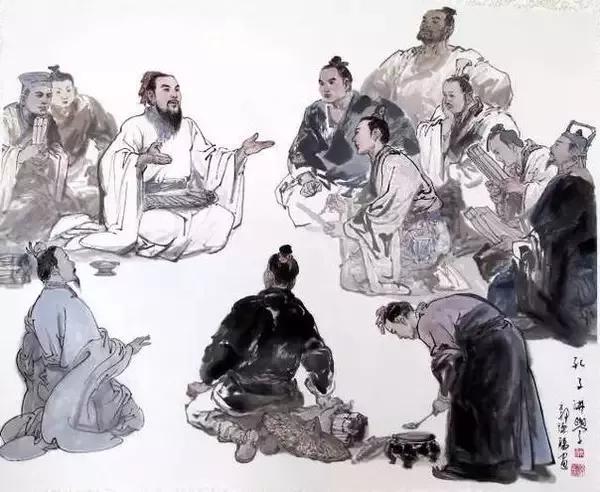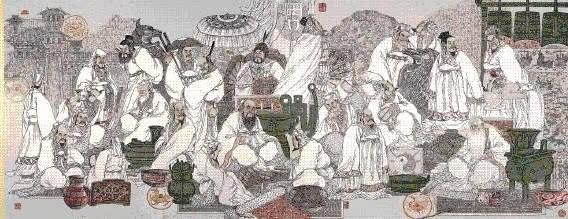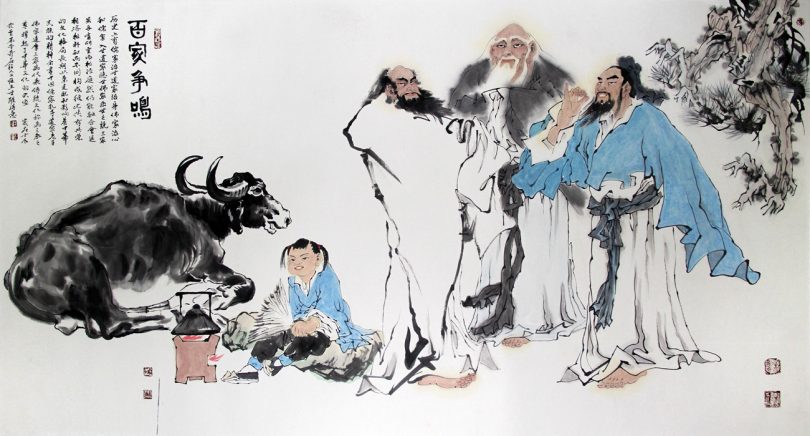Cultural Awakening and Contention of a Hundred Schools of Thought
11 min readIn the late Spring and Autumn Period and the Warring States Period, the irontools and ox-led farming enhanced rapid development of productivity, boosted commerce and town prosperity, and seriously impacted the traditional ritual order. In the reform fever of various kingdoms,a batch of scholars broke the parochial clan network and moved freely. They maneuvered among various political groups and gave lectures here and there, greatly enlarging their field of vision and enhancing cultural awakening.
In the Spring and Autumn Period, the pattern of “cultural learning exclusive to officials and nobles”was broken, and “private schools”for spreading culture established by scholars gradually prevailed. For instance, Confucius of the State of Lu vigorously promoted the thought of “education for all,”with more than 3,000 disciples, including 72 famous ones, some of whom were of humble birth. Widespread education paved the way for the booming culture in that period of transformation.

An intensive yeoman economy showed much more benefits than the simple and extensive farming, which further aroused the enthusiasm inside the producers. Furthermore, the highly-developed handicrafts and commercial sectors and the reforms in all kingdoms aimed at building a more prosperous society helped achieve great scientific and technological progresses in the Spring and Autumn and Warring States periods. Bronze casting techniques were extremely mature, resulting in a vast number of superb bronze artworks. Raw iron could be smelted as early as the Spring and Autumn Period, and cast iron techniques were invented in the Warring States Period, which was 2,000 years earlier than those in the West. The Spring and Autumn Period saw the production of the world’s earliest cementite steel. The Warring States Period witnessed the accomplishment of the Dujiangyan Irrigation System, built by the masses and led by Li Bing and his son. The irrigation system, consisting of the fish-mouth water diversion dike, bottleneck and flying, and weir, was able to prevent and drain floods, as well as irrigate and carry boats. It helped the Chengd Plain develop into a land of abundance and can irrigate tens of millions mu of land even today.
Astronomically, The Shi Star Catalogue recorded the world’s earliest observations of comets in BC 613. The Shi Star Catalogue, the world’s first starcatalogue, recorded the positions of more than 120 stars. Arithmetically, the 9×9 Formula for Multiplication and the Method of Count Calculating were invented. Physically, the Mohist Canon, written in the Warring States Period, includes the Lever Principle and the Theory of Buoyancy, as well as knowledge about acoustics and optics-proof of outstanding achievements made in ancient China. Medically, BianQue,a famous doctor in the Warring States Period, established a theory of four diagnostic procedures, namely inspection, auscultation and olfaction, inquiry, and pulse-taking and palpation.These procedures have been adopted by Chinese doctorsfor 2,000 years and Bian Que was thus reputed as the“ancestor of Chinese pulse-taking science.’
Great scientific advances sped up the awakening of rationalism and cultural spirit.

The Spring and Autumn Period saw the emergence of China’s first poetry collection,The Book of Odes,which is a compilation of 305 odes written in the 500years from the early Western Zhou to the middle Spring and Autumn Period.The book has three parts,namely Feng,Ya and Song.The Feng section(also named Guofeng)is of the highest quality,with records of folk songs in the Spring and Autumn Periodthat include satires on the ruling class,praises for the protesting spirit of the masses,and wishes for beautiful love.With simple and rich languages,The Book of Odes mainly contains four-character sentences and many overlapping sentence forms,marking the formation of Chinese poetry.The inclination toward realism and rhetori means of Fu,Bi and Xing had a far-reaching influence on poets of later generations. In the subsequent Warring States Period,Chu odes,a new form of poetry based on folk songs in the state of Chu in the south,emerged and became popular.With free-style sentences,they are more suitable for expressing complicated feelings.The Lament,written by Qu Yuan,was a collection of famous works in Chu odes expressing his political hopes and patriotic feelings.The poems feature the repeated use of symbol and metaphor,and combine myth,legend,historical figures and natural scenes with magnificent words,distinctive imagination,strong feelings and profound concepts.
The Book of Odes,with Guofeng as its representative,and Chu odes,with The Lament as their representative,are usually combined and called Feng Sao,which reflect the emergence of early cultural spirits and respectively started the realistic and romanticist styles of ancient Chinese poetry.
Two great thinkers with far-reaching influence on Chinese history emerged in the Spring and Autumn Period-Confucius and Lao Tze.

Confucius,named Qiu and style-named Zhongni,was a thinker of the State of Lu. His thoughts were mainly recorded in The Analects of Confucius,a book compiled by his disciples.The essence of Confucianism is Ren(benevolence)and Li(ritual norms).He advocated the idea that”the benevolent loves his fellow people,”andrequested the rulers experience and observe the situation of the people.He was against tyranny and arbitrary punishment.He advocated the behavior codes of loyalt and tolerance,and called for”not doing to others what you don’t want to be done to you”and understanding others to adjust personal relationships and stabilize social order.Confucius also held the opinions of“ruling by morality”and “ruling with the ritual norms”and maintaining the political and educational system of the country by restraining oneself and restoring the ritual system and practice of moral norms.He attempted to correct the confused social class orders in accordance with the ritual system of the Zhou Dynasty and make it perfectly justifiable.This reflected Confucius’conservative political ideology.However,Confucius was not against improving and reforming some obsolete ritual customs and political orders on the basis of maintaining the old system based on social classes. Mencius and Xun Zi in the Warring States Period inherited and developed Confucius’theory and made the political ideals and moral norms of Confucianism the mainstream of traditional thought in China for more than two millennia.
Lao Tze, surnamed Li, named Er and style-named Ran, was a thinker of the State of Chu. Erudite and knowledgeable, he was once the historical official in the royal court of Eastern Zhou, responsible for managing collections. Confucius once askedLao Tze about the knowledge about “ritual norms.”Tao Te Ching,a book compiled b the followers of Taoism in the Warring States Period, records all the thoughts of Lao Tze and is full of philosophy and wisdom typical of the oriental world. Lao Tze denied the absolute authority of destiny, advocated following natural laws and ruling without intervention.”Ruling without intervention”stands for not intervening arbitrarily. Lao Tze warned the rulers not to oppress the common people too much. However, his ideal that “though the noises made by the chickens and dogs can be heard, the people do not contact each other until death”and his opinion “making the people ignorant and without desire”led to some negative effects. His philosophy contains rich dialectic thinking. Lao Tze pointed out that everything ha two contradictory sides, for example-high and low, front and rear, existence and void, difficult and easy, life and death, noble and humble-and both parties couldtransfer to the opposite. Lao Tze has been regarded by later generations as thefounder of Taoism, whose thoughts imposed great influence upon Chinese culture, including philosophy and ethics, as well as the mode of thinking, morality and personality of the Chinese people.
The increasingly intense competition among all vassal states for hegemony in the Warring States Period led to a more urgent need for talents. The profound social reforms offered scholars with improving consciousness a broad stage for independent thinking and creative exploration.
King Xuan of Qi once had hotels near Jimen, Linzi, capital of Qi, expanded to accommodate literators and persuasive talkers, and awarded such scholars as Zou Yan, Tian Pian and Shen Dao mansions and official titles to encourage them write books and establish theories. The academic house at Jimen then grew into a center for communication among various sorts of academic cultures. Under such a background, representatives from different class and schools offered different opinions towardsdifferent issues and held discussions with each other, resulting in the situation of “contention of a hundred schools of thought.”
Among the active schools of thought were Confucianism, Mohist School, Taoism, Legalism, Yin-Yang School, the School of Names, Military School and the School of Eclectics.
Mencius and Xun Zi were the representatives of Confucianism in the Warring States Period. Mencius further developed the “benevolence”thought of Confucius into a systematic political doctrine, proposing the concept of “The people are the most important element in a state; next are the gods of land and grain; least is the ruler himself.”He also stressed “righteousness comes first and then the benefit” and “giving one’s life for righteousness,”and advocated the spirit of “never to be corrupted by wealth or title, never depart from your principles when in poverty and hardship, and surrender never to power and force.”Xun Zi said that ruling a state should be based on ritual norms and supplemented by laws. He also held the opinion that “nature has its laws”that wouldn’t be changed by humans’ wills, but humans should give play to their abilities to “make use of the objective laws” and thus benefit themselves.
The founder of Mohist School was Mo Tzu,a man of humble birth in the State of Lu. He was once a craftsman and later became a senior official of the Song State. Mo Tzu advocated”universal love,”going far beyond the concept of “benevolence”proposed by Confucius that was based on different classes. He considered all the people are equal, no matter they are nobles or commoners. He also upheld “respecting the wise,”employing talented people regardless of which class they come from, and proposed “respecting the working people,”stressing the position of labor in the society. Meanwhile, Mo Tzu opposed extravagance and waste, advocated “thrift in daily life and funerals.”The book Mo Tzu that has been passed down for generations also greatly contributes to natural science and logical science. TheMohist School highlights the interests of the working class, especially those of craftsmen. It was once prominent and widely adopted and cited by other schools.
Zhuang Tzu inherited and developed the thoughts of Lao Tze and was the representative of Taoism in the Warring States Period. He was named Zhou and born in the State of Song. He despised wealth and fame, hated the unfair social phenomena of “stealing ideas from one person is plagiarism, and stealing ideas from many is research.”He once refused the request of the King of Chu to be a senior official, and earned a living by making grass shoes and wrote books for recreation instead. Zhuang Tzu upheld the idea that “natural law”has its own roots and everything is the same in nature. On such a basis, he put forward a playful living attitude of pondering over nothing, and worrying about nothing. He pointed out that “dimensions are limitless, and time is endless.”He recognized the infinity of time and space and believed that humans should obey the natural laws. Politically, Zhuang Tzu upheld the thought of ruling without intervention.
Han Fei,a philosopher of the late Warring States Period, was an integrator of Legalism. In his philosophy, the ruler firmly controls the state with the help ofthree concepts: his position of power (Shi), certain techniques Shu), and laws Fa) to set up a monarchic despotism. He believed laws were the basis of handling state affairs, techniques were the tools for the emperor to control the ministers, and power was the regime and influence of the emperor. He advocated “ruling a state according to law”and “laws don’t protect the powerful persons,”which was of positive significance for attacking the privileges of former nobles and maintaining the centralized system of emerging landocracy. He believed that the society keepsdeveloping and changing, and history will never reverse itself. He was against the historical concept of Confucians,”confirming the ancient practice and denying today’s practice”and advocated reform. In his opinion, ruling the people with the politics of ancient kings was as ridiculous as standing by a tree stump waiting for a hare to dash itself against it. Han Fei’s philosophy met the requirements of establishing a centralized regime and was advocated by Ying Zheng, which made Han’s philosophy the guiding concept of ruling the country. In the more than one millennium since the Western Han Dynasty, his thought and Confucianism supported each other and became the theoretical foundation of the ruling thought of ancientChina. The spirit of reform became the theoretical weapon for progressive thinkers and politicians in the following generations to implement reform.
Yin-Yang School was a school of thought emerging in the late Warring States Period. They socialized the Five-Element Theory known as “Metal, Wood, Water, Fireand Earth,”and believed that social evolution is just like changes of the five elements and the “natural laws”that control everything move in cycles. Representatives include Zou Yan of the State of Qi, who had great influence upon the social ideology in the Qin and Han dynasties.
The School of Names was a school that analyzed and “rectified”the turbulent situation of mixing names with realities in the times of social reforms. Representatives were Hui Shi and Gongsun Long. The followers viewed the similarity- difference relations from a philosophical perspective, and pointed out thedistinctions between feelings and objective facts, as well as entities and attributes. This helped develop logic in China.
The founder of the Military School was Sun Wu,a militarist in the Spring and Autumn Period. His Art of War reveals many tactics of deploying troops as well as military laws such as the systematic and overall way of controlling. He also created a complete system of military theories. It has been considered a classic book of military science that can ensure “fighting a hundred battles with no danger of defeat”and enjoyed an extremely high reputation worldwide. The representative of the Military School in the Warring States Period was Sun Bin, the descendant of SunWu. As the military advisor of Qi, Sun Bin once directed the classic battle known as “saving the Zhao by besieging the capital of the Wei.”Inheriting the thoughts ofSun Wu, he stressed commanding the rules of war and creating favorable situations for oneself and highlighted the role of people. His military thoughts were compiled into the book entitled Sun Bin’s Art of War, which had bamboo-slip versions from the Han Dynasty.
The thoughts of the School of Eclectics were a combination of the above. It was a school shaped in the late Warring States Period, with Lu’s Spring and AutumnAnnals as the most famous representative work. Focusing on the idea of “acting according to the ways of nature,”the book was about state-governing politics that integrate the diverse thoughts of many schools. The Eclectics held that kings shouldrespect teachers and advocate education, put public interests in front of their own, employ talented people and rule the state without arbitrary intervention. Kings should also follow the wills of the people and unify the country with righteous armies.
The argument among the pre-Qin schools and their mutual influence greatly helped promote the prosperity of thoughts and culture. The creative concepts and theories established in all the representative works cover a wide range of fields, including politics, economy, military science, laws, education, philosophy, history, literature, art and natural science, jointly constituting the original classics that guide Chinese ideology and the fundamental spirit of traditional Chinese culture.
Around 5th century BC, both the eastern civilization and western civilization reached a very high level of development. They affected each other and jointly created a spectacle that marked the start of a brand-new era in human history. The city-state democratic politics of ancient Greece, established on the basis of a slavery economy, gave rise to such great thinkers as Socrates, Plato and Aristotle. Meanwhile the profound yeoman reforms and social transformation in China’s Spring and Autumn and Warring States periods offered the environment for the rise of many cultural.








